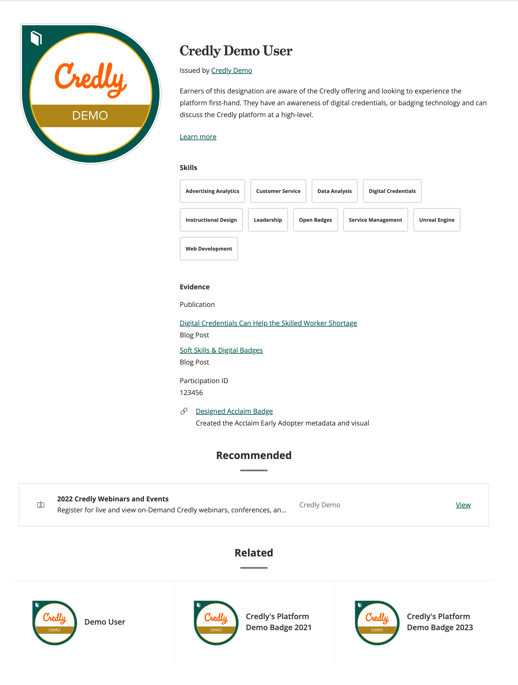Digital credentials, manifested in the form of digital badges, derive their substance from an intricate framework of data, commonly referred to as metadata. This metadata serves as the fundamental foundation of a badge, meticulously outlining the criteria fulfilled by an individual to attain a specific credential, accompanied by tangible proof of the individual meeting those stipulated requirements. It encompasses pivotal information such as the recipient's identity, the issuing entity, the timing of issuance, and the purpose behind the credential, among other pertinent details.

Not all metadata is conceived with equal depth
Consider a scenario where significant time is invested in a comprehensive training program, involving weeks of classroom participation, various projects, academic papers, and a culminating examination. The resultant evidence of one's capabilities is palpable, providing a tangible demonstration of competencies. Subsequently, a digital badge is conferred by the training provider, merely stating: "Completed the ABC training course."
However, such succinct information raises questions about the comprehensive nature of the experience. Does it adequately convey the intricacies of the training? Does it articulate the competencies anticipated as an outcome? Does it underscore the industry's valuation of these competencies? Does it elucidate the instructional and evaluative methods, encompassing projects, papers, and minimum exam thresholds?
Insufficient metadata does a disservice to both the credential earner and the issuing entity. From the earner's perspective, inadequate metadata reduces the entire experience to a concise statement. Conversely, a well-developed digital credential, enriched with detailed metadata, provides the earner with an expanded lexicon to discuss and exhibit their potential. This is particularly appealing for those engaged in reskilling or upskilling endeavors, with robust metadata potentially incorporating tangible evidence of learning in the form of work products.
From the issuer's standpoint, scant metadata reflects inadequately on the organization. Such brevity may represent a missed opportunity to establish the organization as a purveyor of high-quality learning experiences. Rather than differentiating itself from competitors, an organization might inadvertently appear indistinguishable from others providing similar services. In essence, substantive metadata elevates credentials beyond mere gamification.
Unlocking Potential with Comprehensive Metadata
When an issuer utilizes metadata to furnish context, relevance, and the requisites of a credential, it transforms an accomplishment beyond a momentary gamification achievement. Instead, it paves the way for the subsequent steps an earner can undertake in their educational journey. Within the Credly Acclaim network, metadata serves as a guide for earners, offering recommendations for future endeavors, suggesting related badges to pursue, and presenting pertinent professional opportunities aligned with the digital credentials they have earned.
The imperative now is to scrutinize the manner in which digital credentials are authored, ensuring the provision of a comprehensive description of the achievement's relative value, the skills and competencies encapsulated by the credential, the full array of requirements satisfied by the earner, and the diverse assessment methods employed.
For further insights into how your organization can leverage digital credentials, schedule a chat with our team now!